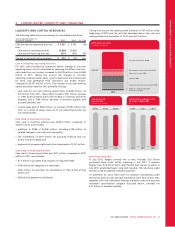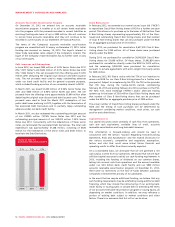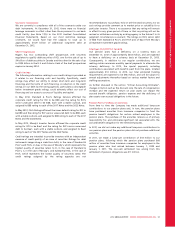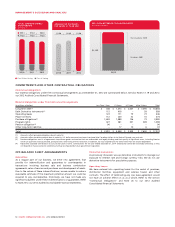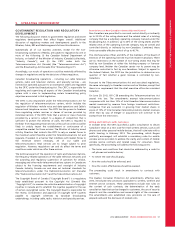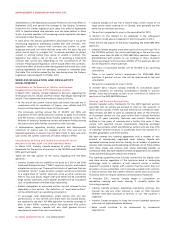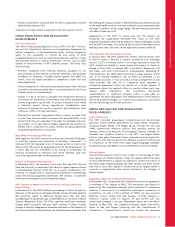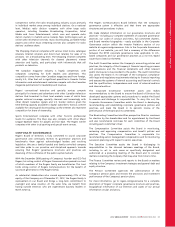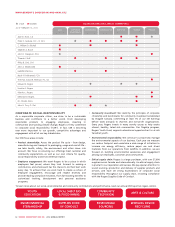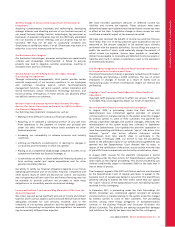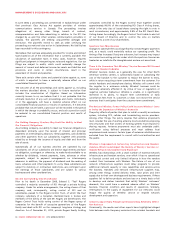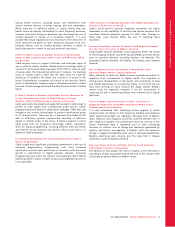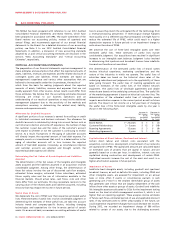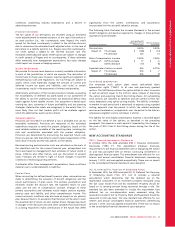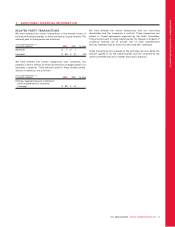Rogers 2012 Annual Report Download - page 65
Download and view the complete annual report
Please find page 65 of the 2012 Rogers annual report below. You can navigate through the pages in the report by either clicking on the pages listed below, or by using the keyword search tool below to find specific information within the annual report.
MANAGEMENT’S DISCUSSION AND ANALYSIS
Competition within the radio broadcasting industry occurs primarily
in individual market areas among individual stations. On a national
level, Media’s radio division competes with other large radio
operators, including Canadian Broadcasting Corporation, Astral
Media and Corus Entertainment, which own and operate radio
station clusters in markets across Canada. New technologies such as
online web information services, music downloading, portable media
players and online music streaming services also compete for radio
stations’ audience share.
The Shopping Channel competes with various retail stores, catalogue
retailers, Internet retailers and direct mail retailers for sales of its
products. On a broadcasting level, The Shopping Channel competes
with other television channels for channel placement, viewer
attention and loyalty, and particularly with infomercials that sell
products on television.
The Canadian magazine industry is highly competitive, with
companies competing for both readers and advertisers. This
competition comes from other Canadian magazines and from foreign,
mostly U.S., titles that sell in significant quantities in Canada. Online
information and entertainment websites compete with the Canadian
magazine publications for readership and revenue.
Rogers’ conventional television and specialty services compete
principally for viewers and advertisers with other Canadian television
stations that broadcast in their local markets, some of which have
greater national coverage, specialty channels and increasingly with
other distant Canadian signals and U.S. border stations given the
time-shifting capacity available to digital subscribers. Various content
available for viewing and downloading via the internet also represent
competition for share of viewership.
Sports Entertainment competes with other Toronto professional
teams for audience. The Blue Jays also compete with other Major
League Baseball teams for players and fan base. The Rogers Centre
competes with other local sporting and special event venues.
CORPORATE GOVERNANCE
Rogers’ Board of Directors is fully committed to sound corporate
governance and continually reviews its governance practices and
benchmarks them against acknowledged leaders and evolving
legislation. We are a family-founded and family-controlled company
and take pride in our proactive and disciplined approach towards
ensuring that Rogers’ governance structures and practices are
deserving of the confidence of the public capital markets.
With the December 2008 passing of Company’s founder and CEO Ted
Rogers, his voting control of Rogers Communications passed to a trust
of which members of the Rogers family are beneficiaries. This trust
holds voting control of Rogers Communications for the benefit of
successive generations of the Rogers family.
As substantial stakeholders who owned approximately 27% of the
equity of the Company as of December 31, 2012, the Rogers family is
represented on our Board and brings a long-term commitment to
oversight and value creation. At the same time, we benefit from
having outside Directors who are experienced business leaders in
North America.
The Rogers Communications Board believes that the Company’s
governance system is effective and that there are appropriate
structures and procedures in place.
We make detailed information on our governance structures and
practices – including our complete statement of corporate governance
practices, our codes of conduct and ethics, full committee charters,
and Board member biographies – easily available in the Corporate
Governance section within the Investor Relations section of our
website at rogers.com/governance. Also in the Corporate Governance
portion of our website, you will find a summary of the differences
between the NYSE corporate governance rules applicable to U.S.-
based companies and our governance practices as a non-U.S.-based
issuer that is listed on the NYSE.
The Audit Committee reviews the Company’s accounting policies and
practices, the integrity of the Company’s financial reporting processes
and procedures and the financial statements and other relevant
public disclosures to be provided to the public. The Audit Committee
also assists the Board in its oversight of the Company’s compliance
with legal and regulatory requirements relating to financial reporting
and assesses the systems of internal accounting and financial controls
and the qualifications, independence and work of external auditors
and internal auditors.
The Corporate Governance Committee assists and makes
recommendations to the Board to ensure the Board of Directors has
developed appropriate systems and procedures to enable the Board
to exercise and discharge its responsibilities. To carry this out, the
Corporate Governance Committee assists the Board in developing,
recommending and establishing corporate governance policies and
practices, and leads the Board in its periodic review of the
performance of the Board and its committees.
The Nominating Committee identifies prospective Director nominees
for election by the shareholders and for appointment by the Board
and also recommends nominees for each committee of the Board
including each committee’s Chair.
The Compensation Committee assists the Board in monitoring,
reviewing and approving compensation and benefit policies and
practices. The Compensation Committee is responsible for
recommending senior management compensation and for monitoring
succession planning with respect to senior executives.
The Executive Committee assists the Board in discharging its
responsibilities in the intervals between meetings of the Board,
including to act in such areas as specifically designated and
authorized at a preceding meeting of the Board and to consider
matters concerning the Company that may arise from time to time.
The Finance Committee reviews and reports to the Board on matters
relating to the Company’s investment strategies and general debt and
equity structure.
The Pension Committee supervises the administration of the
Company’s pension plans and reviews the provisions and investment
performance of the Company’s pension plans.
For more information, go to rogers.com/governance for a complete
description of Rogers’ corporate governance structure and practices,
biographical information of our Directors and copies of our annual
information circular and proxy.
2012 ANNUAL REPORT ROGERS COMMUNICATIONS INC. 61


